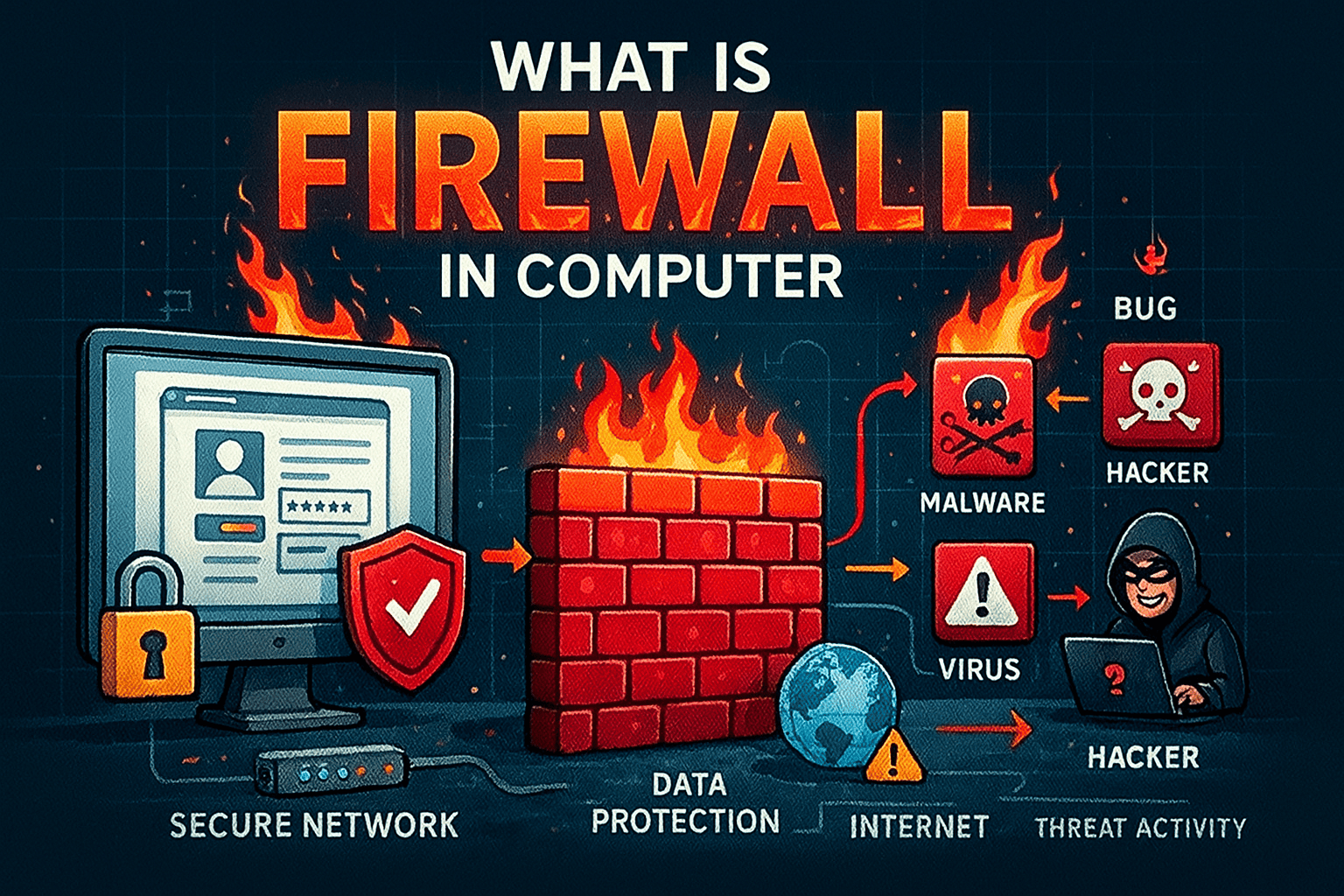Updated on September 23, 2025, by OpenEDR
When it comes to cybersecurity, one of the most common questions asked by IT leaders and executives is: what is firewall in computer and why is it so important?
A firewall acts as the first line of defense against cyberattacks by filtering traffic and blocking unauthorized access. Even with advanced tools like AI-driven security and endpoint protection, firewalls remain a fundamental layer of protection.
With cyberattacks costing businesses over $10 trillion annually by 2025, knowing how firewalls work is no longer optional—it’s essential.
What Is Firewall in Computer?
A firewall in computer is a security system that monitors and controls incoming and outgoing network traffic. It acts as a digital gatekeeper, allowing safe data to pass through while blocking suspicious or harmful activity.
Think of it as a security guard for your computer network. Just like a guard checks IDs before letting people into a building, a firewall checks traffic before allowing it into your system.
Key Functions of a Firewall:
Filters unwanted or malicious traffic
Blocks unauthorized users from accessing private networks
Prevents malware and hacking attempts
Allows safe data communication
Why Firewalls Are Essential for Businesses
For IT managers, CEOs, and cybersecurity professionals, firewalls are more than just technical tools—they are business enablers. Without them, organizations face:
Data Breaches: Sensitive financial or customer data could be stolen.
Ransomware Attacks: Hackers may exploit open ports or weak defenses.
Compliance Issues: Standards like HIPAA, PCI DSS, and GDPR require strong network security.
Operational Downtime: A single cyberattack can halt operations for days or weeks.
👉 Verdict: Firewalls are essential not just for compliance but also for protecting reputation and customer trust.
Types of Firewalls
When discussing what is firewall in computer, it’s important to understand that there are different types, each serving unique roles.
1. Packet-Filtering Firewalls
Oldest and simplest type.
Inspects data packets entering or leaving the network.
Limited protection but fast.
2. Proxy Firewalls (Application-Level)
Acts as an intermediary between users and the internet.
Provides deeper inspection of traffic.
Can filter by content, application, or user behavior.
3. Stateful Inspection Firewalls
Tracks the state of active connections.
More secure than packet filtering.
Widely used in enterprises.
4. Next-Generation Firewalls (NGFWs)
Combines traditional firewall features with advanced tools.
Includes intrusion prevention systems (IPS), deep packet inspection, and application awareness.
Best suited for modern enterprises.
5. Cloud Firewalls
Delivered as a service.
Protects cloud-based infrastructures.
Scales easily for growing businesses.
How Firewalls Work
To understand what is firewall in computer, let’s look at how it works step by step:
Traffic Monitoring: Every piece of data (packet) entering or leaving the network is inspected.
Rule Application: Firewalls follow pre-defined security rules (e.g., block traffic from known malicious IPs).
Decision Making: If traffic matches rules, it’s allowed; otherwise, it’s blocked.
Logging & Alerts: Suspicious activity is logged for administrators to review.
👉 Example: If an employee tries to access a suspicious website, the firewall can block the connection before malware infects the network.
Benefits of Using a Firewall
✅ Protects against unauthorized access
✅ Prevents malware and phishing attacks
✅ Enforces compliance requirements
✅ Monitors and logs suspicious activity
✅ Reduces risk of data breaches
Firewall vs Antivirus: What’s the Difference?
| Feature | Firewall | Antivirus |
|---|---|---|
| Function | Filters network traffic | Scans and removes malware |
| Focus | Prevention of unauthorized access | Detection and removal of threats |
| Protection Level | Network-level security | Device-level security |
| Complementary? | Yes, they work best together | Yes, with firewalls for layered defense |
👉 Takeaway: A firewall prevents intrusions, while antivirus removes infections. Both are crucial.
Best Practices for Firewall Security
To maximize firewall effectiveness, IT managers should:
✅ Regularly update firewall rules.
✅ Use Next-Generation Firewalls (NGFWs) for advanced protection.
✅ Combine firewalls with EDR (Endpoint Detection & Response).
✅ Monitor logs for unusual patterns.
✅ Restrict unnecessary ports and protocols.
Why Firewalls Alone Aren’t Enough
Firewalls are critical, but cybercriminals are smarter than ever. Attackers may bypass firewalls using phishing, social engineering, or zero-day vulnerabilities.
That’s why businesses need layered security, combining:
Firewalls
EDR solutions
Zero Trust architecture
Regular security awareness training
👉 Tools like OpenEDR provide real-time endpoint monitoring and incident response, working with firewalls to ensure full protection.
FAQs: What Is Firewall in Computer?
1. Is a firewall enough to protect my computer?
No, firewalls are essential but should be combined with antivirus and EDR for complete protection.
2. Do I need a firewall if I already have antivirus?
Yes. Antivirus protects your device, while a firewall protects the network traffic.
3. Can hackers bypass firewalls?
Yes, through phishing or advanced exploits. That’s why layered security is crucial.
4. Do businesses need hardware or software firewalls?
Most enterprises use both—hardware firewalls for networks and software firewalls for individual devices.
5. Is Windows Defender Firewall enough?
It’s fine for individuals, but enterprises need NGFWs and EDR solutions for advanced protection.
Conclusion: Firewalls Are Your First Line of Defense
So, what is firewall in computer? It’s your network’s digital gatekeeper, protecting against unauthorized access, malware, and cyberattacks. While basic firewalls provide some security, modern businesses must invest in Next-Generation Firewalls and EDR solutions to stay ahead of evolving threats.
Firewalls form the foundation of security, but they’re most effective when part of a multi-layered defense strategy.
👉 Secure your endpoints today: Register for OpenEDR Free
